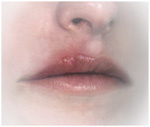Cold sores (also known as fever blisters) are liquid-filled blisters that erupt around the lips and mouth, and sometimes under the nose or around the chin. Approximately 80% of the population have had cold sores.
What causes cold sores?
Cold sores are caused by a chicken-pox-like virus called herpes simplex I. This is not the same virus that causes genital herpes (herpes simplex II). The cold sore virus stays in the body once a person is affected. In some people it remains inactive. However, with most people, it occasionally travels down the nerve located near the cheekbone to the lips. This results in a breakout around the lips. On some sufferers, the outbreak will occur under the nose or on the chin.
After the initial infection, there are several things that can cause cold sores to recur. Among these factors are emotional stress, fever, illness, sunlight, fatigue and menstruation.
What do cold sores look like?

In most people, the initial infection does not create any symptoms. The virus is dormant until a future point in time. Many people who get recurring cold sores feel tingling or burning at the location about one day before the sore erupts.
After the initial stage of the outbreak, there is a reddening and swelling of the area. Then the sore erupts. The sore or sores are usually fluid-filled and can be painful. In the following few days, the sores begin to seep fluid and crack. After this stage, the sores begin to dry up and form scabs. The scabs then begin to fall off and the outbreak has run its cycle. Products that penetrate and relieve burning can be used on cold sores.
Are cold sores contagious?
Yes, cold sores are contagious. This means other people can get cold sore if they come in contact with someone who has cold sores. Cold sores are most contagious when they are oozing fluid. But the virus can be transmitted to others even during times when you have no visible blisters.
Canker sores, on the other hand, are not contagious.
How to get rid of cold sores?
Cold sores typically start to heal on their own within a few days. But if cold sores cause you pain and embarrassment, there are a few things you can do to speed up the healing of your cold sores.
- Avoid excessive exposure to sunlight.
- Keep the sore area clean so that it doesn’t attract bacteria. Refrain from pinching the sore. Wash hands after each time the sore is touched.
- Since others can be affected with the virus, avoid kissing people during the outbreak. Also, avoid sharing food utensils and drinking cups.
- Ask your dentist or pharmacist to recommend a product that will provide pain relief from the sore.
- Individual preferences may be the deciding factor between choosing a penetrating liquid or a protective film-forming gel. Both types provide quick relief of pain.